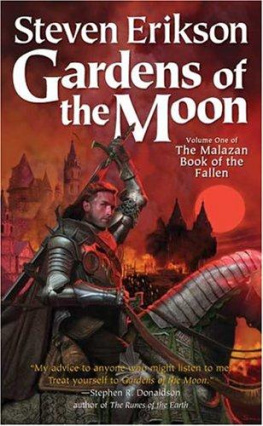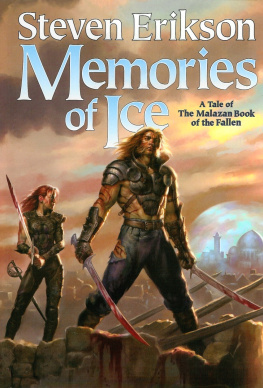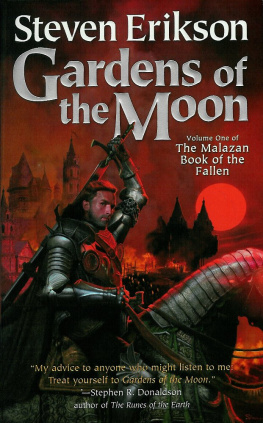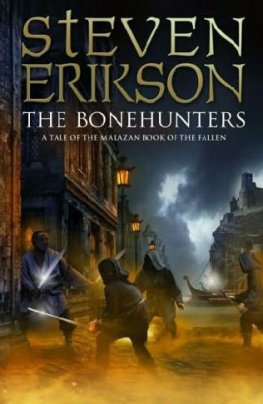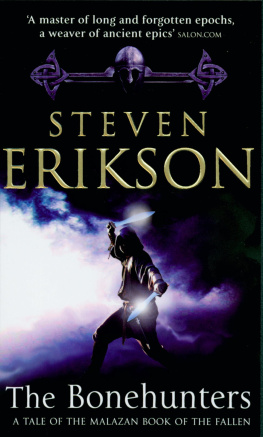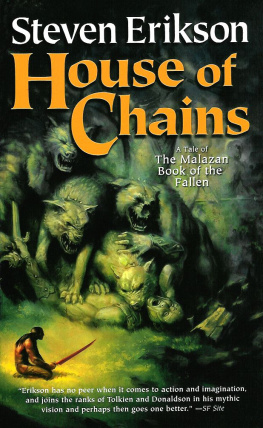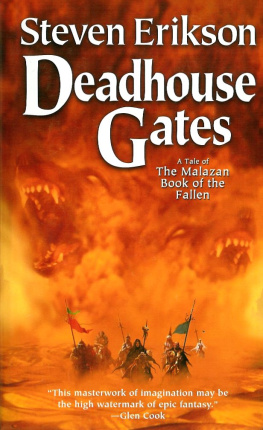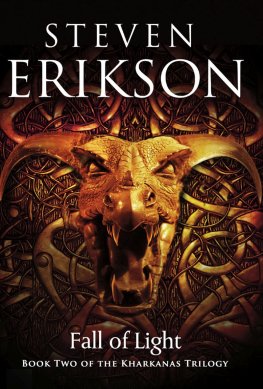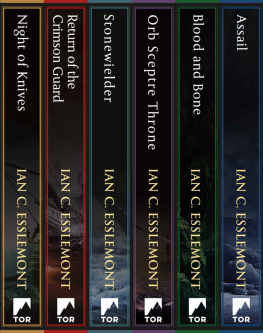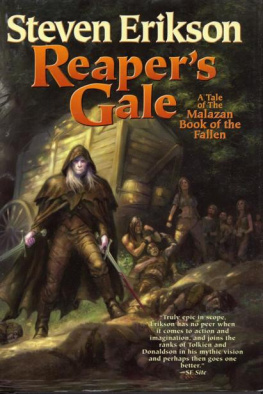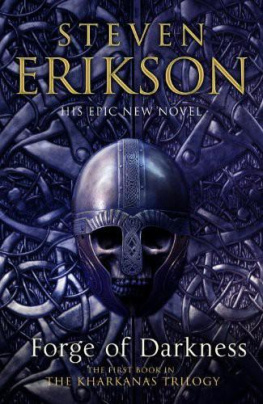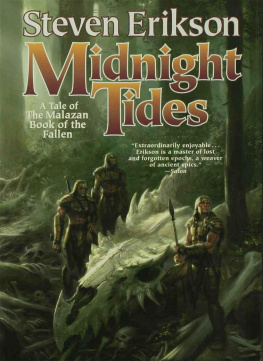Steven Erikson - Gardens of the Moon (Malazan Book of the Fallen)
Here you can read online Steven Erikson - Gardens of the Moon (Malazan Book of the Fallen) full text of the book (entire story) in english for free. Download pdf and epub, get meaning, cover and reviews about this ebook. year: 2009, publisher: Tor Books, genre: Detective and thriller. Description of the work, (preface) as well as reviews are available. Best literature library LitArk.com created for fans of good reading and offers a wide selection of genres:
Romance novel
Science fiction
Adventure
Detective
Science
History
Home and family
Prose
Art
Politics
Computer
Non-fiction
Religion
Business
Children
Humor
Choose a favorite category and find really read worthwhile books. Enjoy immersion in the world of imagination, feel the emotions of the characters or learn something new for yourself, make an fascinating discovery.
- Book:Gardens of the Moon (Malazan Book of the Fallen)
- Author:
- Publisher:Tor Books
- Genre:
- Year:2009
- Rating:5 / 5
- Favourites:Add to favourites
- Your mark:
- 100
- 1
- 2
- 3
- 4
- 5
Gardens of the Moon (Malazan Book of the Fallen): summary, description and annotation
We offer to read an annotation, description, summary or preface (depends on what the author of the book "Gardens of the Moon (Malazan Book of the Fallen)" wrote himself). If you haven't found the necessary information about the book — write in the comments, we will try to find it.
Gardens of the Moon (Malazan Book of the Fallen) — read online for free the complete book (whole text) full work
Below is the text of the book, divided by pages. System saving the place of the last page read, allows you to conveniently read the book "Gardens of the Moon (Malazan Book of the Fallen)" online for free, without having to search again every time where you left off. Put a bookmark, and you can go to the page where you finished reading at any time.
Font size:
Interval:
Bookmark:
Gardens of the Moon
A Tale of the MalazanBook of the Fallen
Steven Erikson
This novel is dedicatedto
I. C. Esslemont
worlds to conquer worlds to share
No novel is everwritten in isolation. The
author wishes to thank the following fortheir
support over the years: Clare Thomas, Bowen,
MarkPaxton-MacRae, David Keck, Courtney,
Ryan, Chris and Rick,Mireille Theriacelt,
Dennis Valdron, Keith Addison, Susan,David
and Harriet, Clare and David Thomas Jr, Chris
Rodell,Patrick Carroll, Kate Peach, Peter
Knowlson, Rune, Kent and Valand the kids,
my tireless agent Patrick Walsh, and Simon
Taylor,one terrific editor.
There is no point inbeginning something without ambition. In so many aspects of my life Ihave held to that notion, and it has led to more than one fiery crashthrough the years. I still recall, with some bitterness, the responseCam (Ian C. Esslemont) and I received when flogging our co-writtenfeature film and television scripts: 'Wonderful! Unique! Very funny,very dark... but here in Canada, well, we just can't budget for thisstuff. Good luck.' In many ways, it was what followed by way ofadvice that proved the most crushing. 'Try something ... simpler.Something like everything else out there. Something less ...ambitious.'
We'd walk out ofmeetings frustrated, despondent, baffled. Did we really hear aninvitation to mediocrity? Sure sounded like it.
Well, screw that.
Gardens of theMoon. Just to muse on that title resurrects all those notions ofambition, all that youthful ferocity that seemed to drive me headlongagainst a wall time and again. The need to push. Defyconvention. Go for the throat.
I like to think I wasentirely aware of what I was doing back then. That my vision wascrystal clear and that I was actually standing there, ready to spitin the face of the genre, even as I reveled in it (for how could Inot? As much as I railed against the tropes, I loved reading thestuff). Now, I'm not so sure. It's easy to ride on instinct in themoment, only to look back later and attribute cogent mindfulness toeverything that worked (while ignoring everything that didn't). Tooeasy.
In the years and manynovels since, certain facts have made themselves plain. Beginningwith Gardens of the Moon, readers will either hate my stuff orlove it. There's no in-between. Naturally, I'd rather everybody lovedit, but I understand why this will never be the case. These are notlazy books. You can't float through, you just can't. Even moreproblematic, the first novel begins halfway through a seemingmarathon you either hit the ground running and stay on yourfeet or you're toast.
When challenged withwriting this preface, I did consider for a time using it as a meansof gentling the blow, of easing the shock of being dropped from agreat height into very deep water, right there on page one of Gardensof the Moon. Some background, some history, some setting of thestage. I've since mostly rejected the idea. Dammit, I don't recallFrank Herbert doing anything like that with Dune, and if anynovel out there was a direct inspiration in terms of structure, thatwas the one. I'm writing a history and fictional or not, history hasno real beginning point; even the rise and fall of civilizations arefar more muddled on the front and back ends than many people mightthink.
Gardens of theMoon's bare bones first saw life in a role-playing game. Its firstdraught was as a feature film co-written by the two creators of theMalazan world, myself and Ian C. Esslemont; a script that languishedfor lack of interest ('we don't do fantasy films because they suck.It's a dead genre. It involves costumes and costume dramas are asdead as Westerns' all this before a whole slew of productioncompanies shoved that truism in their faces, all this long beforeLord of the Rings hit the big screen).
And that was just it.We were there. We had the goods, we knew that Adult Epic Fantasy wasfilm's last unexplored genre we didn't count Willow,which only earned merit in our eyes for the crossroads scene; therest of the stuff was for kids through and through. And all the otherfilms coming out in that genre were either B flicks or egregiouslyflawed in our eyes (gods, what could have been done with Conan!).We wanted a Fantasy version of The Lion in Winter, the onewith O'Toole and Hepburn. Or The Three Musketeers adaptationwith Michael York, Oliver Reed, Raquel Welch, Richard Chamberlain,etc, just add magic, mates. Our favourite television production wasDennis Potter's The Singing Detective, the original one withGambon and Malahyde. We wanted sophisticated shit, you see. We werepushing Fantasy in that sizzling, scintillating context ofjaw-dropping admiration. We were, in other words, as ambitious ashell.
Probably, too, weweren't ready. We didn't quite have the stuff. Thinking past ourabilities, trapped in the lack of experience. The curse of the young.
When life took Cam inone direction and me in another, we both carried with us the notesfor an entire created world. Constructed through hours upon hours ofgaming. We had an enormous history all worked out the rawmaterial for twenty novels, twice as many films. And we each hadcopies of a script nobody wanted. The Malazan world was there inhundreds of hand-drawn maps, in pages upon pages of raw notes, inGURPS (Steve Jackson's Generic Universal Role Playing System an alternative to AD&D) character sheets, building floor-plans,sketches, you name it.
The decision to beginwriting the history of the Malazan world began a few years later. Iwould convert the script into a novel. Cam would write a relatednovel entitled Return of the Crimson Guard (and now, all theseyears later, and fresh on the heels of his Night of Knives,Cam's first epic, Return, is going to be published). As works offiction, authorship would belong to the actual writer, the personputting word after word onto the page. For Gardens, theconversion meant almost starting from scratch. The script was threeacts all set in Darujhistan. The main events were the assassin war onthe rooftops and the grand, explosive finale of the fete. There wasvirtually nothing else. No back story, no context, no realintroduction of characters. It was, in fact, more Raiders of theLost Ark than The Lion in Winter.
Ambition never goesaway. It may shuffle off, grumbling, feet dragging, only to slideacross into something else usually the next project. Itdoesn't take 'no' for an answer.
In writing Gardens,I quickly discovered that 'back story' was going to be a problem nomatter how far back I went. And I realized that, unless I spoon-fedmy potential readers (something I refused to do, having railed oftenenough at writers of fantasy epics treating us readers as if we wereidiots), unless I 'simplified', unless I slipped down into thewell-worn tracks of what's gone before, I was going to leave readersfloundering. And not just readers, but editors, publishers, agents...
But, you know, as areader, as a fan, I never minded floundering at least for alittle while, and sometimes for a long while. So long as other stuffcarried me along, I was fine. Don't forget, I worshipped DennisPotter. I was a fan of DeLillo's TheNames and Eco'sFoucault's Pendulum. The reader I had in mind was one whocould and would carry the extra weight the questions not yetanswered, the mysteries, the uncertain alliances.
History has proved thisout, I think. Readers either bail on the series somewhere in thefirst third of Gardens of the Moon, or they're still sharingthe ride to this day, seven going on eight books later.
I have been asked,would I have done it any differently in hindsight? And I honestlydon't have an answer to that. Oh, there are elements of style thatI'd change here and there, but ... fundamentally, I'm just not surewhat else I could have done. I am not and never will be a writerhappy to deliver exposition that serves no other function thantelling the reader about back story, history, or whatever. If myexposition doesn't have multiple functions and I do meanmultiple then I'm not satisfied. Turns out, the morefunctions in it, the more complicated it gets, the more likely itwill quietly shift into misdirection, into sleight of hand, and allthe back story elements, while possibly there, end up buried andburied deep.
Next pageFont size:
Interval:
Bookmark:
Similar books «Gardens of the Moon (Malazan Book of the Fallen)»
Look at similar books to Gardens of the Moon (Malazan Book of the Fallen). We have selected literature similar in name and meaning in the hope of providing readers with more options to find new, interesting, not yet read works.
Discussion, reviews of the book Gardens of the Moon (Malazan Book of the Fallen) and just readers' own opinions. Leave your comments, write what you think about the work, its meaning or the main characters. Specify what exactly you liked and what you didn't like, and why you think so.

